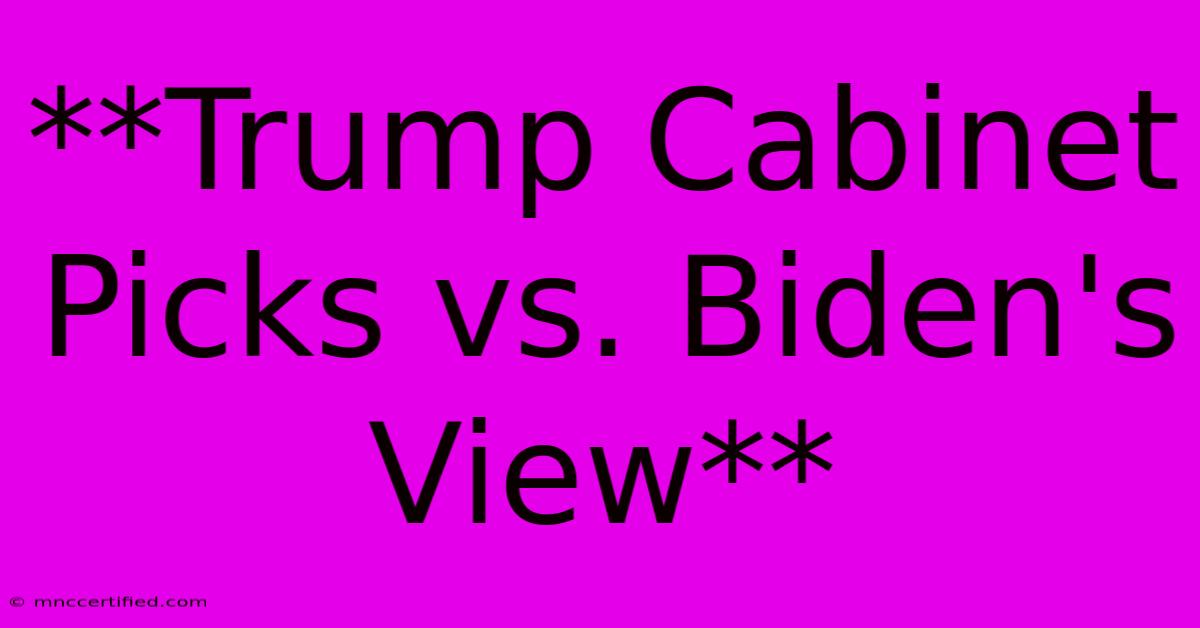**Trump Cabinet Picks Vs. Biden's View**

Table of Contents
Trump Cabinet Picks vs. Biden's View: A Clash of Ideologies
The appointment of cabinet members is a crucial aspect of any new presidential administration, as it directly impacts policy implementation and the overall direction of government. The starkly contrasting approaches of President Donald Trump and President Joe Biden to cabinet appointments underscored the significant ideological differences between the two parties.
Trump's Cabinet: A Focus on Business and Conservative Values
President Trump's cabinet selections were largely characterized by their business backgrounds and conservative political leanings. He appointed CEOs, investors, and other high-profile individuals with little to no prior government experience.
Key Cabinet Picks under Trump:
- Betsy DeVos (Education): A staunch advocate for school choice and privatization, DeVos faced criticism for her lack of experience in public education.
- Scott Pruitt (Environmental Protection Agency): A climate change skeptic and former Oklahoma Attorney General, Pruitt's appointment was met with concern by environmentalists.
- Ben Carson (Housing and Urban Development): A retired neurosurgeon and political outsider, Carson lacked experience in housing policy and was seen as a symbolic pick.
- Rex Tillerson (State): A former ExxonMobil CEO, Tillerson's selection was viewed with skepticism due to his close ties to the oil industry.
Biden's Cabinet: Experience and Diversity as Priorities
In contrast to Trump's approach, President Biden prioritized experience, diversity, and a focus on policy expertise in his cabinet selections. He appointed individuals with extensive government backgrounds, including many experienced career civil servants.
Key Cabinet Picks under Biden:
- Janet Yellen (Treasury): A former Federal Reserve Chair with a strong understanding of the economy, Yellen's appointment signaled a return to traditional economic policies.
- Xavier Becerra (Health and Human Services): A former California Attorney General and advocate for healthcare access, Becerra's appointment reflected Biden's commitment to expanding healthcare coverage.
- Marcia Fudge (Housing and Urban Development): A former congresswoman with a long history of fighting for affordable housing, Fudge's appointment aimed to address housing insecurity.
- Antony Blinken (State): A seasoned diplomat and former Deputy Secretary of State, Blinken brought extensive foreign policy experience to the role.
The Broader Implications
The contrasting approaches to cabinet appointments reflected the fundamental differences in the political ideologies of the two administrations. Trump's focus on business and conservative values aimed to dismantle regulations and reduce the size of government. Biden's focus on experience, diversity, and policy expertise emphasized a return to traditional governance and a commitment to expanding government programs.
Beyond Policy: The Impact on Governance
The differing approaches to cabinet appointments also had significant implications for the overall effectiveness and legitimacy of government. Trump's reliance on political outsiders, some with limited government experience, led to accusations of incompetence and conflict of interest. Biden's focus on experienced professionals, including career civil servants, aimed to restore a sense of normalcy and professionalism to government.
The Future of Cabinet Appointments
The ongoing debate over cabinet appointments reflects the larger political divide in the United States. As future administrations navigate this complex issue, they will need to carefully balance the need for expertise, political ideology, and public trust in government.

Thank you for visiting our website wich cover about **Trump Cabinet Picks Vs. Biden's View**. We hope the information provided has been useful to you. Feel free to contact us if you have any questions or need further assistance. See you next time and dont miss to bookmark.
Featured Posts
-
Cash Only Bonds What Does That Mean
Nov 14, 2024
-
Three New Players Join Razorback Volleyball
Nov 14, 2024
-
Investment Property Jacksonville Fl
Nov 14, 2024
-
Get Free Doughnuts For Kindness Day
Nov 14, 2024
-
Whoopi Goldbergs Tv Network Dedicated To
Nov 14, 2024